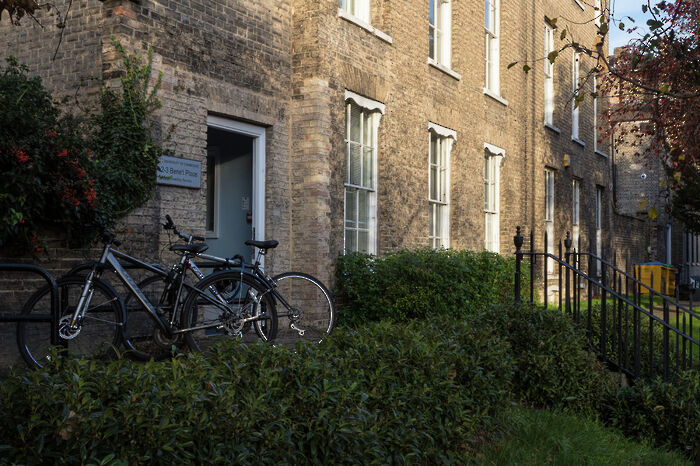University denies disruptions to counselling service
University officials deny waiting time spike and session limits at the University Counselling Service, contradicting official documents

Cambridge University has seemingly contradicted both the executive and annual report of the University Counselling Service (UCS), as further questions arise after the revelation that staff resignations significantly disrupted counselling operations over the past two academic years.
A University spokesperson denied both that waiting times for counselling have risen during recent years, and that the UCS has never imposed limits on the number of counselling sessions students were offered, despite official evidence to the contrary.
“Waiting times ebb and flow but overall, in the past four years, there has been no increase in waiting time in the service,” they said, despite the disclosure last week that some students had to wait up to five weeks to get an appointment in Lent term 2016.
Last week, Varsity revealed that the UCS, which offers centralised counselling and mental health support for students, had been operationally disrupted by staff resignations. Multiple staff leaving the service, combined with sickness and a retirement, led to significantly increased wait times for students seeking counselling two years ago. During the last year staffing shortages from a failure to re-recruit resulted in cuts to the levels of counselling that could be provided.
Once Varsity had gone to press last week, the UCS released its latest annual report, containing new statistics and information about its operations.
Assessing complaints made about the UCS during 2016–17, the report says “most of the complaints received about the counselling service relate to students having to wait for their appointments, or having a limit to the number of sessions available.” The report then quotes a complaint which suggests “Extending [counselling] beyond 6 sessions if possible to do some longer term work.”
Last week, this paper reported that the UCS had sought to move away from a set number of sessions, though this had been framed as a way of avoiding costly and inefficient unnecessary extra counselling for students deemed to have sufficiently recovered.
The report suggests that some students were told the numbers of sessions they could have was limited even if they may have felt they required more.
Varsity contacted the University to clarify whether the UCS limits the number of counselling sessions which students can receive. A spokesperson for the University said: “there have never been a set number of sessions at UCS as we tailor our responses to the individual needs of every student”, apparently contradicting both the annual report and a meeting of the UCS’s executive cited by Varsity last week.
The new annual report is accompanied by a statistic sections for the first time. The figures released include monthly statistics for referrals to the service, covering the past four years, which reveal how demand for the UCS fluctuates over the course of the academic year.
The figures show that demand for the service consistently peaks in October and January, and was typically at is highest throughout full term, dropping to lower levels over the vacation period. The months spanned by Michaelmas and Lent term consistently saw higher levels of counselling referrals than those of Easter term.
There is an apparent disconnect in the new statistics between referrals and counselling sessions. In 2016/17, there were 2,179 referrals to the service, but only 1,575 counselling clients. In 2013/14, this disparity was reversed, with 1,565 referrals but a greater number of clients, at 1,592. Asked to explain the relationship between the figures, and how many referrals did not result in a student becoming a counselling client, a University spokesperson said: “This information is not compiled in a reportable format, it varies from year to year.”
High referral numbers during November and March in particular raise the possibility that some students who do not stay in the city during the vacation period may have to delay their appointments until full term begins again. In Lent 2016, when some students were experiencing extended waiting times, this runover period might have begun in early February.
Varsity asked the University what process takes place if a student is still awaiting counselling going into the vacation period. A University spokesperson said: “We organise appointments depending on the situation and the clients,” adding “The high number of [undergraduates] who are in Cambridge during the holidays are offered appointments during the holiday period.”
The latest annual report also contains a breakdown of the average number of sessions offered to students. It shows that 48% of the UCS’s student clients for 2016-17 received one to three sessions of counselling, including the initial assessment appointment. 40.61% of clients were seen for four to eight sessions, while 11.3% had nine or more. The report said “There were a number of staffing changes at the start of the academic year”, apparently referring to the influx of new staff that occurred in Michaelmas last year, reported by Varsity last week
 News / Cambridge student numbers fall amid nationwide decline14 April 2025
News / Cambridge student numbers fall amid nationwide decline14 April 2025 News / Greenwich House occupiers miss deadline to respond to University legal action15 April 2025
News / Greenwich House occupiers miss deadline to respond to University legal action15 April 2025 Comment / The Cambridge workload prioritises quantity over quality 16 April 2025
Comment / The Cambridge workload prioritises quantity over quality 16 April 2025 Features / The TikTok college: using social media in access and outreach15 April 2025
Features / The TikTok college: using social media in access and outreach15 April 2025 Sport / Cambridge celebrate clean sweep at Boat Race 202514 April 2025
Sport / Cambridge celebrate clean sweep at Boat Race 202514 April 2025







